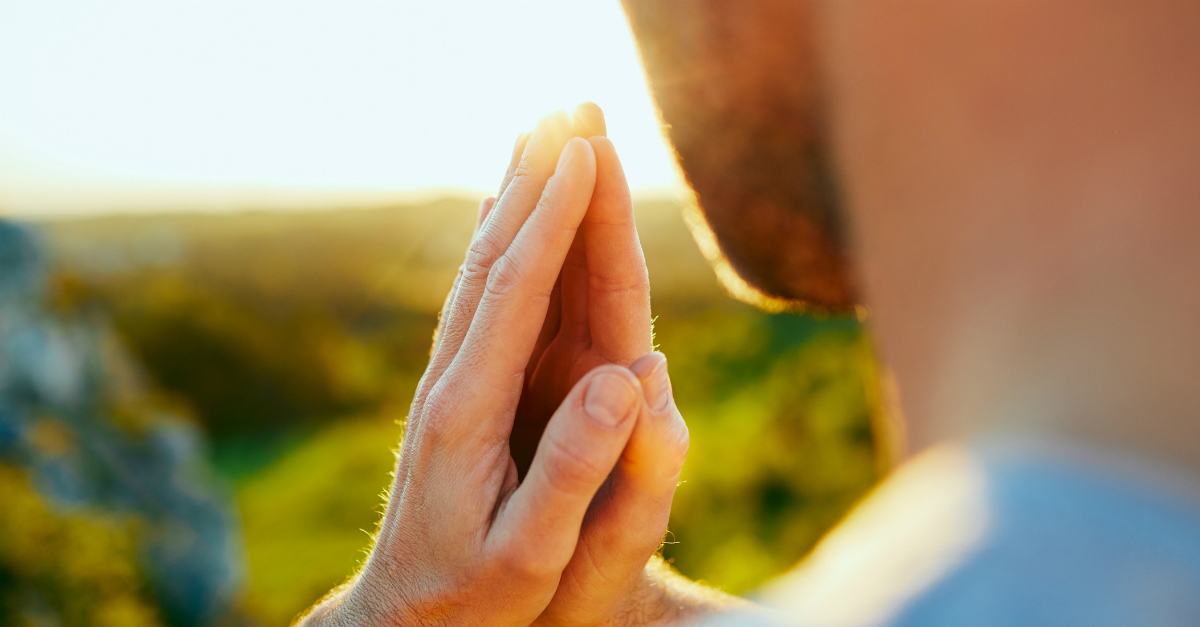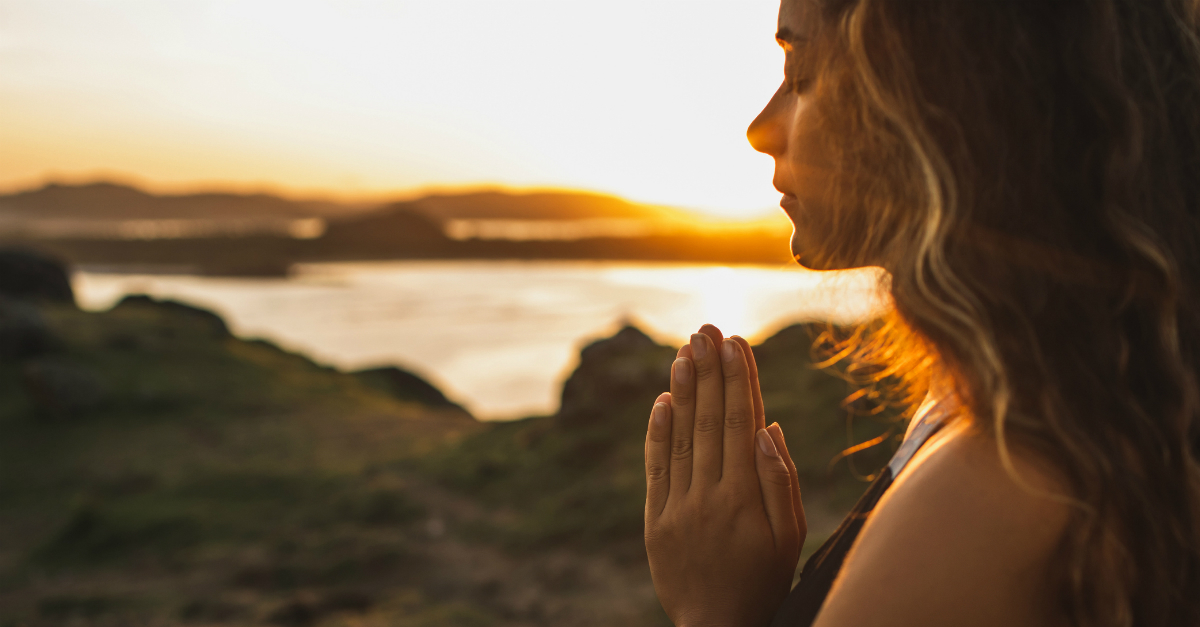
I am a morning person, although I’m not usually rising before the sun does. But those mornings when I can’t sleep, I get up early and watch the sky transform from black to gray to pink. I witness a horizon streaked with orange and gold. For me, these are holy moments.
I don’t use a list or a journal. I don’t bow my head. I for sure don’t close my eyes. But I breathe worship. Without realizing it, I pray before dawn, and that prayer changes me for the rest of the day.
Will prayers before dawn change your day? There’s no way of knowing what might or might not happen if you pray before everyone else gets up. The time of day is not critical to developing a prayer life, but it can certainly be instrumental.
While there’s nothing intrinsically spiritual about the morning, I do notice that when I wake up praying or when I pray first after rising, I begin my day with unusual focus, resolve, and humility. When I lift up a prayer before dawn, I begin as the best version of myself.
Psalm 55:17 lays out the template for when you should pray: “Evening, morning and noon I cry out in distress, and he hears my voice.” The emphasis for prayer here is not on morning prayers or mealtime prayers or bedtime prayers, although that’s when many of us remember to pray. The idea of praying morning, noon, and night is that I am praying continually (1 Thessalonians 5:17).
God hears us whenever we pray. But if you’re like me, remembering to pray gets harder as the day goes on. We have so many demands on our time and attention, it becomes difficult to sit in the holy moments and watch God work. It’s hard to even find the holy moments.
Photo Credit: ©GettyImages/BartekSzewczyk
Why Is Prayer before Dawn a Great Idea?
God’s presence happens when we invite it.
Of course, God is omniscient, so he never leaves us. He speaks to us regardless of where we are or what time it is. But something remarkable happens when we re-orient our souls to our savior at the beginning of the day.
Preachers have often used Psalm 63:1 to argue for having your “quiet time” (prayer and Bible reading) in the morning because the verse says, “early will I seek thee.” However, this verse isn’t dictating what time of day you should pray; it’s establishing a priority principle of seeking God first. The word for early is sahar, which can mean “early” or “earnestly.” It doesn’t matter when you seek God; it matters that you do it earnestly, seriously, and intentionally.
Jesus reiterated the importance of prayer in Matthew 6:1-15. Nowhere does he dictate the time of day to pray, although he stresses the attitude of prayer and gives his disciples a template for prayer, which we know as “The Lord’s Prayer.”
Jesus demonstrated prayer's importance by praying at all times of the day. But when he prayed alone, he often prayed before dawn. Jesus prioritized fueling his soul. “Very early in the morning, while it was still dark, Jesus got up, left the house and went off to a solitary place, where he prayed” (Mark 1:35). And here’s the truly remarkable afterword. Whenever we read about Jesus praying alone with God the Father, the verses that follow contain miracles and spiritual warfare. Jesus leaves his prayer time charged up and ready to defeat the devil.
Here are 5 ways that saying a prayer before dawn (or whatever time you rise) might radically alter your life.
1. Concentrating on God first changes your priorities.

Whoever or whatever we think about first thing in the morning is often the most important concern to us that day. All of us prioritize our own concerns, our families, our friends, and our careers. But Scripture calls us to make God preeminent in our lives. The first of the Ten Commandments instructs Israel: “You shall have no other gods before me” (Exodus 20:2). In fact, the first four commandments are all about putting God first--not as the number one task on a list of objectives, but as the master of the list:
- Don’t have any other gods (Exodus 20:2)
- Don’t make or worship graven images/idols (Exodus 20:3)
- Don’t misuse God’s name (Exodus 20:4)
- Keep God’s day holy (Exodus 20:5)
Paul explains Jesus’ preeminence like this: “And he is the head of the body, the church; he is the beginning and the firstborn from among the dead, so that in everything he might have the supremacy” (Colossians 1:18).
2. Seeking God brings you blessing.
In Deuteronomy 11, God promises to bless his people if they obey his laws and curse his people if they disobey. God’s commands are to worship, particularly through prayer (1 Thessalonians 5:17) and fellowship (Hebrews 10:24-25).
With the vast array of responsibilities and pressures, finding time for uninterrupted worship might seem hard. But Jesus said worship is an all-day response to being in a relationship with him (Deuteronomy 6:4-9) and a natural outpouring from a priority that begins with God (Matthew 6:32-33).
Photo Credit: ©GettyImages/ irishblue
3. Hearing from God requires solitude.
It feels impossible to hear from the Lord when the noise of our culture surrounds us nearly every minute of the day. From social media to family, friends, and co-workers, we all struggle to separate God’s truth from the world’s truth.
Throughout Scripture, those who wanted to hear from God prioritized isolating themselves against their schedules and pressures to wait and listen for God to instruct, comfort, convict, and direct.
Moses sought God’s face alone on Mount Sinai many times. Jacob and Hagar both met God alone in the wilderness. David worshipped alone in the pasture, writing songs while he watched his father’s sheep. During a severe drought, Elijah spent years safely tucked away from Ahab, witnessing God’s daily miracles of provision. Jesus regularly rose before dawn to pray to his Father.
When the crowds mobbed him, and everyone needed his touch, Jesus still set aside time to communicate with his Father. “But Jesus often withdrew to lonely places and prayed” (Luke 5:16). He found the time and place to be alone with God. In my life, that usually happens in the early morning.
Jesus spent his two most significant recorded prayer times alone with his Father: in the wilderness and in a garden at night: 1) when the devil tempted him to forfeit his mission (Matthew 4) and 2) when Jesus prepared for his crucifixion. Jesus knew that nothing would prepare him for his calling except time in prayer (John 17).
4. Calm your spirit.
Stifle your worries; or better yet, give them to the Lord. A day started with prayer is a day begun handing over your fears to God for his control.
Peter tells the persecuted church, “Cast all your anxiety on him because he cares for you” (1 Peter 5:7). God knows we have worries. Anxiety is integral to the human condition. But the act of “casting” them in the Greek means to throw away or take off. We literally have the ability to take off our anxiety like pajamas and put on the fruit of the spirit like work clothes (Galatians 5:22-23).
Sometimes, it’s hard to find the time and place for a spiritual wardrobe change. God has a system for that, too. Ephesians 4:17-32 details a process for taking off habits that harm us and replacing them with habits that fulfill and complete us. With the Holy Spirit’s power, we can completely change our outlook and our actions by doing the opposite of what comes naturally.
5. Nature brings us in tune with God’s spirit and presence.

Sometimes nature is the best way to start your day and your prayer time.
Maybe you obsess over sunsets and sunrises like I do. Maybe you sit for hours at the ocean watching the surf beat the seashore. Or maybe you hike, climb, ski, fish, or some other outdoor activity that affords you ample time to view undisturbed scenery around you. If you’ve done that, you know that nestling into God’s canvas stirs something inside of you. His creation awakens your soul and draws you into his presence. God invites us to pray whenever we see the world he has made.
What Prayerful Morning Worship Looks Like
David penned a responsive prayer in Psalm 8:3-4: “When I consider your heavens, the work of your fingers, the moon and the stars, which you have set in place, what is mankind that you are mindful of them, human beings that you care for them?”
You can include anything you want in your morning prayer. I suggest modeling your prayer after so many prayers in the Bible: start with worship. Then confess your sins. Then share your concerns and ask for help. Intercede for others. Fight for truth. But always start with worship. It prepares you for all the other things you will say.
A morning prayer could look like this:
Worship: Lord, I am amazed at your creation and thankful for your love and grace in my life.
Confession: Please forgive me for my sins (be specific).
Lament: Lord, I’m so worried about ________.
Request: Take away my anxiety and my fear.
Intercession: I pray for your power and comfort for _________.
In Jesus’ name, Amen.
That’s how saying a prayer can change you.
Worship changes us because it moves our perspective off of what we can control (or think we can control) onto the Person who controls everything. Prayer reminds us of who we are compared to who God is. And a morning prayer reminds our spirit that God goes forward with us into our day.
And that’s why prayer before dawn can change everything you think, feel, and do.
Photo Credit: ©GettyImages/olegbreslavtsev